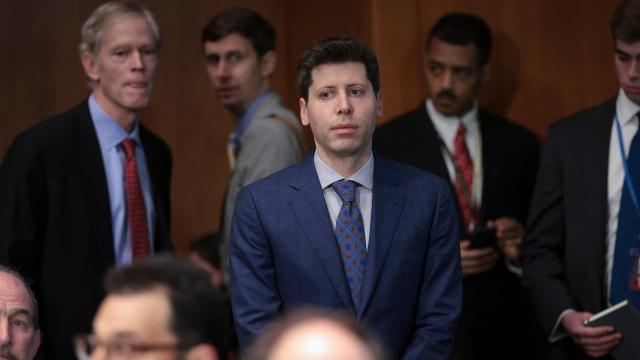OpenAI CEO Sam Altman’s overseas charm offensive is continuing the AI hype train he started with his recent talks in front of U.S. Congress. Though unlike in the AI-friendly U.S., Altman has threatened to take his big tech toys to the other end of the sandbox if they’re not willing to play by his rules.
Altman has been on the move — from Lagos, Nigeria to all throughout Europe. Finally in London, UK, he dodged a few protestors to engage with big tech folks, businesses, and policy makers about his AI models. His main pitch has been to promote the large language model-powered ChatGPT and stump for pro-AI regulatory policies. During a side panel discussion hosted by the University College London, Altman reportedly said that while OpenAI was “gonna try to comply” with EU regulations with the AI act, he was miffed by the way the European body defined “high-risk” systems.
The EU’s AI Act is one of the laws proposed by the governing body in 2021 that would classify AI into three risk categories. Some AI poses an “unacceptable risk” like social scoring systems, manipulative social engineering AI, or really anything that would be “violating fundamental rights.” On the lower end, a “high-risk AI system” depends on its intended use, but they would have to comply with across-the-board standards for transparency and oversight.
Altman said under the way the proposed law is currently drafted, both ChatGPT and the large language model GPT-4 could be designated high-risk. This would require the company to comply with certain requirements. According to Time, the OpenAI CEO said “If we can comply, we will, and if we can’t, we’ll cease operating… We will try. But there are technical limits to what’s possible.”
In reality, the law was designed to combat potential AI uses like China’s social credit system and facial recognition. Then came OpenAI and fellow startups in the AI field, first with diffusion AI image generation, and then with the hugely popular large language model-based ChatGPT. The EU drafted new provisions to the law in December that would impose safety checks and risk management on “foundational models” such as the LLMs that run the AI chatbots. A committee in the European Parliament approved these changes earlier this month.
The EU has been more willing to scrutinize OpenAI than the U.S. The EU’s European Data Protection Board said it was monitoring ChatGPT to make sure it complied with its privacy laws. Of course, the AI Act isn’t set in stone, and the language can change, which is likely another reason for his worldwide tour.
Altman otherwise reiterated some the same talking points he gave in front of Congress last week. According to The Verge, Altman promoted the idea that he too is shivering in his night shift at the dangers present with AI, but that there were also many potential benefits. The OpenAI CEO told U.S. lawmakers, he was all for regulation that could even include new safety requirements or a governing agency to test products and ensure regulatory compliance. He called for some regulation “between the traditional European approach and the traditional U.S. approach,” whatever that means.
Though at the same time, Altman said he didn’t want any regulation that restricted users’ access to the tech. He told his London audience he didn’t want anything that could harm smaller companies or the open source AI movement (as a reminder, OpenAI is decidedly more closed off as a company than it’s ever been, citing “competition”). That’s not to mention any new regulation would inherently benefit OpenAI, so when things inevitably go wrong it can point to the law to say they were doing everything they needed to do. New compliance checks would also make developing new AI models from scratch more expensive, giving the company a leg up in the ongoing AI rat race.
There’s been a few countries that have already banned ChatGPT. Italy banned the service in March but it’s far-right government eventually unbanned the service after OpenAI gave users more access to privacy controls. Perhaps OpenAI can keep throwing enough bones to make the world’s governments happy. Of course, that’s as long as it can contain its over 100 million active ChatGPT users.
Want to know more about AI, chatbots, and the future of machine learning? Check out our full coverage of artificial intelligence, or browse our guides to The Best Free AI Art Generators, The Best ChatGPT Alternatives, and Everything We Know About OpenAI’s ChatGPT.
